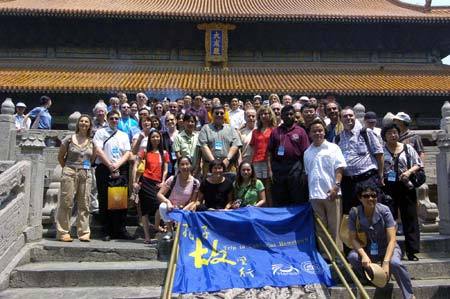VIII-1 Question: Despite a surge in Chinese studies abroad, people have little knowledge about the Confucius Institutes that China has been greatly promoting in recent years. What lies behind the launch of these institutes? What further strategies will be taken in promoting Chinese teaching overseas?
A: As foreign exchanges deepen between China and the rest of the world, the value of Chinese culture and the language is enhanced, making Chinese increasingly popular with other nations and peoples in major parts of the world. It is estimated that universities in more than a hundred countries have Chinese courses, with 25-30 million foreign students involved. The uniqueness of Chinese culture, China's rising status as an influential world power, and enormous business opportunities within the country, make learning the language a very attractive option.
Non-profit Confucius Institutes have been established worldwide in a move to offer foreign China-enthusiasts a more authentic learning environment, and to further promote traditional culture. Confucius was a renowned philosopher of ancient China, like Cervantes of Spain and Goethe of Germany. In cooperation with local academies, the Chinese party offers assistance in building these institutes, to strengthen the capability of the faculty, and to provide Chinese learners with more authoritative textbooks and reading material.
Rough figures show that since November 2004, when the first Confucius Institute opened in Seoul, the capital of South Korea, more than 140 such academic institutes have been established, extending through more than 50 countries and regions by March 2007. Study methods have been varied: these have included multimedia remote courses via the Internet, intensive training programs, special courses on business, tourism and medicine, as well as other cultural exchange programs. The testing of language levels and qualification of teaching staff called HSK, sponsored by these institutes, are well accepted by local communities. Learning Chinese has been a vital way for foreigners to know more about present-day China. Through its integration with local culture, this pattern of Chinese study has been a proven success in major areas.
Despite China's efforts to promote its language globally, a shortage of professional teachers and the absence of a unified set of textbooks have created problems for local students. It is estimated that by 2010, there will be 100 million people learning Chinese throughout the world, for which 4 million more teachers will be needed. To resolve this problem, 17 universities have been designated as supporting units of this Confucius project, in which Chinese teachers and student volunteers are recruited and selected. Meanwhile, China plans to adopt more ways to diversify its teaching mechanism, through the opening of diploma education, short-term and joint exchange programs, buildup of more remote learning courses and training of more qualified Chinese teachers.
China hopes that mutual understanding and friendship with other nations will be strengthened by courtesy of these academic exchange programs. It is expected that in five to 10 years, a more comprehensive and complete Chinese study mechanism will be available to foreign students all over the world, under which growing economic and cultural dialogues will be seen.

(China.org.cn)